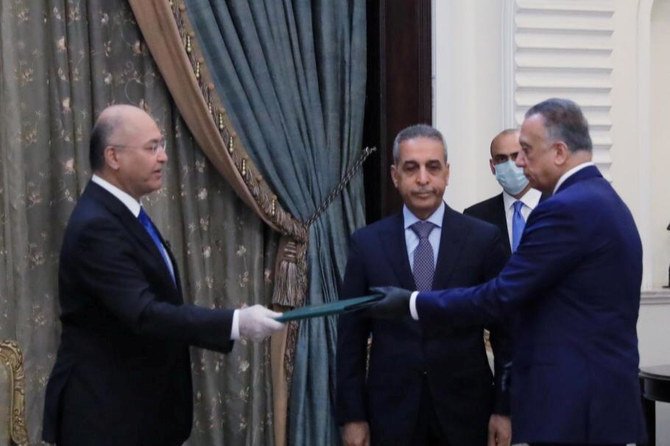
- ARAB NEWS
- 11 Jul 2025

BAGHDAD: Iraq’s intelligence chief was appointed the country’s third prime minister-designate in just over a month Thursday after the resignation of the most recent candidate amid political infighting.
The upheaval threatened a leadership vacuum at the helm of the government amid a severe economic crisis and viral pandemic.
Adnan Al-Zurfi’s candidacy was imperiled in the past 48 hours when key Shiite parties rallied around Iraq’s intelligence head, Mustafa Al-Kadhimi, to replace him. His chances were further diminished when the main Kurdish and Sunni blocs withdrew support for his candidacy.
Iraq’s president appointed Kadhimi, 53, as prime minister-designate shortly after Al-Zurfi’s resignation.
“With my mandate to lead the Iraqi government, I pledge to my honorable people to work to form a government that puts the aspirations and demands of Iraqis as the top priority,” Kadhimi tweeted shortly after his appointment was announced.
Kadhimi was appointed by former Prime Minister Haidar Al-Abadi as head of the Iraqi National Intelligence Service and has served in this post since June 2016.
In a resignation letter to Saleh, Al-Zurfi cited “internal and external reasons” that prevented him from carrying out his duties as premier-designate. He had presented a government plan focusing on the economy, reconstruction and bringing arms under the control of the state, but fell short of producing a Cabinet lineup to parliament.
“I offer my apologies first to everyone who put their trust in us,” the letter said.
Al-Zurfi faced stiff resistance from Iraq’s powerful Iran-backed political parties since his appointment in March. On April 4, eight Iran-backed militia groups issued a joint statement accusing Al-Zurfi of being an “American agent” and threatened lawmakers if they approved his proposed cabinet.
Five weeks of political dysfunction over his government formation risked deepening the political crisis in Iraq as the country faces severe financial hardship with plummeting oil prices and a multi-billion-dollar budget deficit.
The crude-exporting country earned just $2.9 billion from March oil exports at $28 per barrel, slashing in half government projections to fund state spending. Over 90 percent of Iraq’s state revenue is derived from oil exports.
Meanwhile, the country is struggling to fund measures to contain the spread of the new coronavirus, with health officials reporting a shortage in testing equipment and ventilators. At least 69 people have died among more than 1,200 confirmed cases, according to Health Ministry figures.
Kadhimi’s appointment as premier-designate also comes a week after Esmail Ghaani, head of Iran’s expeditionary Quds Force, visited Baghdad. Iraq officials said the Iranian general suggested in meetings that Iran and the Revolutionary Guard did not want Al-Zurfi as prime minister.
Al-Zurfi is the second premier hopeful to withdraw since caretaker Prime Minister Adil Abdul-Mahdi resigned in December under pressure from mass protests. Mohammed Allawi, a former communications minister, stepped down last month, citing obstruction from political parties and after failing to garner support for his proposed Cabinet.
Kadhimi, who is backed by parties across Iraq’s fragmented political scene, is unlikely to face the same setbacks as Allawi and Al-Zurfi. In addition to key Shiite parties, Iraq’s largest Sunni parliamentary bloc, Al-Qiwa, and president of northern Kurdish region, Nechirvan Barzani have issued statements supporting his candidacy.
According to Iraq’s constitution, he has 30 days to present a Cabinet lineup to parliament.
AP